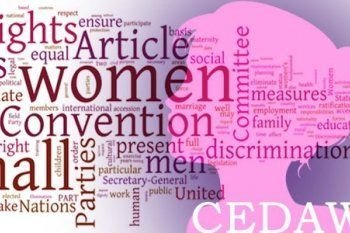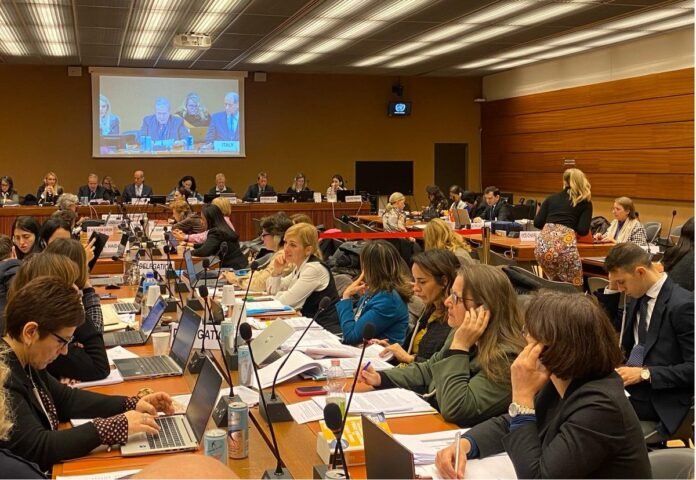GENEVA, FEBRUARY 4 – The Committee on the Elimination of Discrimination against Women last week reviewed the eighth periodic report of Italy, with Committee Experts commending the State on its “robust gender architecture, while asking questions about human trafficking and gender parity in politics”.
A Committee Expert commended Italy on its gender architecture, which was in accordance with the Convention. The gender architecture was composed of the Ministry of Equal Opportunities, the Department on Equal Opportunities directly linked to the Prime Minister, and the Inter-Ministerial Committee on Human Rights. The political and institutional structure was robust but complex.
 Another Committee Expert said Italy was at the forefront of the reception of refugees. Many women were trafficked during several parts of their journey. How did the State party guarantee these women’s access to protection in all circumstances? Were non-governmental organizations permitted to run interviews with trafficked persons to assist them? How was individualised risk assessment conducted before forced removals? How would the State party implement a referral and identification process throughout Italy and strengthen the capacity of the reception system?
Another Committee Expert said Italy was at the forefront of the reception of refugees. Many women were trafficked during several parts of their journey. How did the State party guarantee these women’s access to protection in all circumstances? Were non-governmental organizations permitted to run interviews with trafficked persons to assist them? How was individualised risk assessment conducted before forced removals? How would the State party implement a referral and identification process throughout Italy and strengthen the capacity of the reception system?
One Expert regretted the slow progress made by Italy regarding political representation. The 2017 electoral law imposed a 40 per cent quota on electoral lists. However, these rules were not respected. There were fewer female members of parliament in this term, compared to the previous one. Why was there not a fifty-fifty parity? What measures did the State party plan to take to encourage parity at all levels? How many standing committees in parliament were chaired by women?
The delegation said a coordinated approach was carried out to identify cases of trafficking and victims, and to protect potential victims. The most important step was to coordinate forces at the time of receiving migrants on the shores. Police forces were present in all 106 provinces and had been acting in cooperation with other entities. When victims were identified, they were approached with interpreters and cultural mediators. Victims could then be taken to shelters, which had been created to protect trafficking victims. The International Organization for Migration carried out interviews with cultural mediators.
The delegation agreed that there had been a decrease in the representation of women in parliament. However, the first elections after the reform had reduced the number of members of parliament, so it was difficult to precisely compare data. There is a female Prime Minister in Italy for the first time, and the leader of the opposition is also a woman, showing that women representation is present in political life in Italy. Significant measures and initiatives had been carried out during elections to allow women to participate more. The trend was positive and further improvement was expected to finally achieve a fifty-fifty balance.
Fabrizio Petri, President of the Inter-ministerial Committee on Human Rights of Italy and head of the delegation, presenting the report, said Italy had adopted concrete policies to strengthen gender mainstreaming in all its actions and measures, including by integrating the gender perspective throughout the national recovery and resilience plan. Italy had adopted its first national strategy for gender equality 2021-2026. The 2024 budget law provided for a total allocation of 141 million euros for the Department of Equal Opportunities, of which more than 96 million euros were dedicated to the fight against gender-based violence; approximately 20 million euros were dedicated to the fight against human trafficking; and 18.5 million euros were intended for expenditure on interventions for the promotion of equal opportunities, training of housewives and house-husbands, and the implementation of the national strategy for gender equality. A new kindergarten bonus had also been introduced and greater maternity and paternity protection.
In concluding remarks, Mr. Petri thanked the Committee for the dialogue which had been extremely interesting. It had been an honour to provide the Committee with information about Italy’s ongoing efforts.
The delegation of Italy was comprised of representatives from the Ministry of Foreign Affairs and International Cooperation; the Ministry of Interior; the Ministry of Justice; the Ministry of Education and Merit; the Ministry of Labour and Social Policies; the Ministry of Health; the Senate of the Republic; the Chamber of Deputies; the Italian Agency for Development Cooperation; the Presidency of the Council of Ministers; the National Institute of Statistics; the Authority Guarantor on Communications; and the Permanent Mission of Italy to the United Nations Office at Geneva.
The Committee on the Elimination of Discrimination against Women’s eighty-seventh session is being held from 29 January to 16 February. All documents relating to the Committee’s work, including reports submitted by States parties, can be found on the session’s webpage. Meeting summary releases can be found here. (@OnuItalia)

